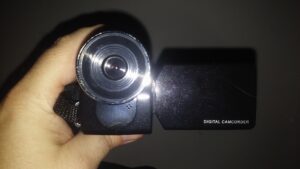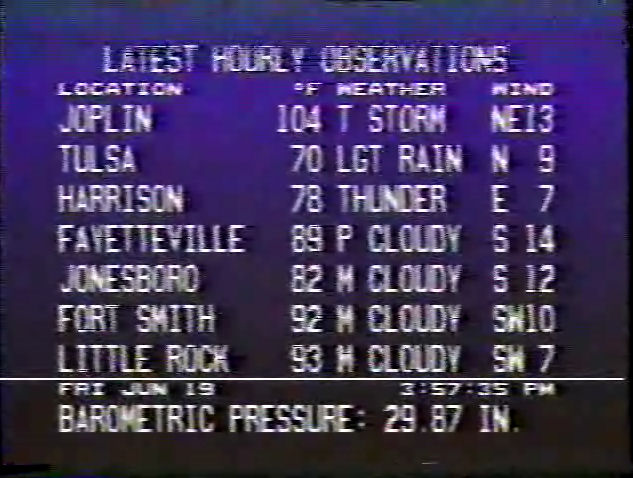 A friend’s mention of the HD restoration of Bambi Meets Godzilla triggered a distant memory of something on TV that was actually – so help me – fun and exciting and mind-expanding. At the dawn of the 1980s, USA Network’s overnight weekends were filled not with informercials, but with the marvel of free-association video that was Night Flight.
A friend’s mention of the HD restoration of Bambi Meets Godzilla triggered a distant memory of something on TV that was actually – so help me – fun and exciting and mind-expanding. At the dawn of the 1980s, USA Network’s overnight weekends were filled not with informercials, but with the marvel of free-association video that was Night Flight.
Night Flight was the first place I saw a lot of music videos, including Art Of Noise’s “Close (To The Edit)”, and the first place I was exposed to quite a bit of music that, let’s just say, wasn’t getting airtime on local radio – this was the first place I ever heard punk. It was also the first time I’d seen any of John Waters’ pre-mainstream films, and the first time I’d ever heard of the Church of the SubGenius. (My other major source for breaking down musical barriers was my older brother, who graduated high school in 1981 and promptly went off to college, bringing home a lot of stuff that he’d been exposed to via college radio – I distinctly remember him exposing me to R.E.M. when they had a single or two out, but not an entire album).
Sometime, Night Flight’s selection of experimental short films, foreign delicacies (such as Dynaman), hilariously out-of-date public safety films (this was also the first place I ever saw Reefer Madness, which I did not realize was not a parody at the time), music videos and obscure/experimental movies was free-flowing and disassociated. Sometimes it had a theme. Sometimes they’d even tell you what the theme was – other times you’d have to guess until they told you. The themed nights were pretty interesting, because the first order of business, having established a theme, was to see how far it could be stretched.
To put it mildly, it was a formative experience. Even if it was only within the realm of pop culture, frequently with a little bit of exposure to the politics and lifestyles behind that culture, I daresay Night Flight was educational. Some of my early political awareness – if you can even say that about someone who’s all of about ten years old – came from looking further into topics brought up on that show. By comparison, when the local cable system finally picked up that decadent MTV network by overwhelming demand, MTV seemed aimless and disorganized by comparison to Night Flight.
And then it vanished. According to Wikipedia, Night Flight ended its run around 1988, replaced by USA Up All Night. Instead of a thoughtfully assembled pulled together from a seemingly disparate bunch of material, we got second-rate comedians with cleavage doing interstitial bits during the commercial breaks of heavily-edited grade-B-or-below teen sex comedies (i.e. the stuff that made Revenge Of The Nerds look like high art). Now, knowing what age I would’ve been around then, I’m pretty sure the blow of losing Night Flight was buffered somewhat by the arrival of cleavage (what can I say, there are things I find pleasantly and instantly distracting, whether in my teens or my 40s), but the best you could expect out of Up All Night was that they’d show, once in a blue moon, a Troma movie.
How formative an experience was Night Flight? On my first TV job, we’d frequently have shows that came up short (someone had assemble-edited over the end credits or the final segment), in which case we’d have to fill with some evergreen or semi-evergreen filler material (extended-length promos, such as three-or-four minute behind-the-scenes pieces provided by syndicators), and I’d try my damnedest to group them by theme, though the finite amount of material made that an uphill climb most days. My second TV job was even better: I got to come up with the Invasion, which was a deliberate grouping-together of all the sci-fi/fantasy shows on the station’s existing schedule, a planetary alignment that the station management had not noticed.
The truth of the matter was that this was just the tip of the iceberg of what I really would have loved to do, which would’ve been to do a genre-specific version of Night Flight. Group material together by theme (say, a specific astronomical phenomenon used as a plot point) and find non-fiction material to intersperse between shows and commercial breaks to lend a bit more credibility to the selection. I seem to remember hearing that Sci-Fi Channel did this occasionally in its earliest days, back when they’d have people like Harlan Ellison on as a guest; one can scarcely imagine Harlan associating himself with the schlock factory that Syfy has become. These days, one could even throw in the odd sci-fi-themed music video – such a beast, does in fact, exist.
(mumble mumble transparent excuse to show you Christina Hendricks mumble)… it is kind of vaguely PKD-ish in its own way, though
But now that there’s such a thing as Youtube and its playlists, who needs Night Flight? Even by the time someone tried to revive both the name and the format in the 1990s, there was no need. Cable had expanded beyond USA Network. Between cable and the then-abundant syndication glut available through non-network affiliated local stations, niche programming was gaining ground. Who needed an overnight programming block built around themed randomness and controlled chaos?
Nowhere is this so evident as a conversation I recently had with Little E where we talked about his mom’s working hours:
E: Dad, what did you do to work?
ME: I used to work at a TV station all night.
E: What’s a TV station?
ME: Well, it shows certain shows at certain times, and there are commercials in the shows…
E: Can you pause it?
ME: Well, kind of. You have to have a special recorder to do that.
E: Is it as easy as the Wii? [referring to our hacked Wii with a catch-all media player that streams stuff from a server PC]
ME: Probably not.
E: Why doesn’t everyone just have a Wii?
ME [feeling the death of the whole rationale behind commercial-based broadcast happening all around me and realizing that my entire professional life has been a waste, which is probably why I have no job now]: …
There’s a kid who has grown up with random access. What on Earth would he need a TV station for? Even a five-year-old can see that there’s nothing in it for him as a viewer. (And yet, when we first cut the TV portion of our cable off and went to shows-stored-on-a-computer, I still found myself theming the playlists I’d set up for his afternoon cartoon viewing…)
So, there you have it. Night Flight influenced my whole approach to doing TV. I always wanted to make something that was as intriguing and unpredictable as Night Flight. Maybe someday I will, but it’ll have to be something short-form – a self-contained show in its own right* – which isn’t the same beast at all.
* watch this space



+ There are no comments
Add yours